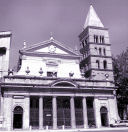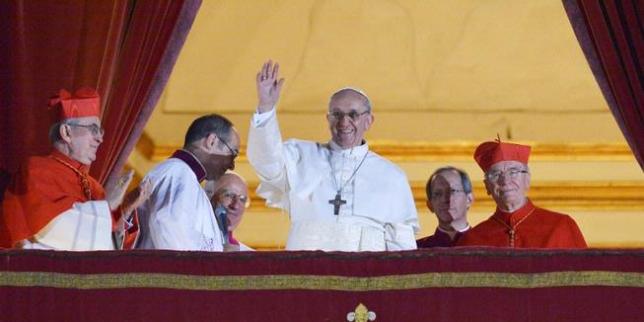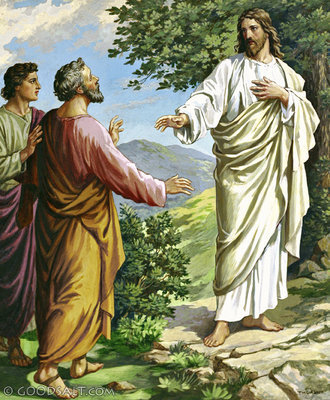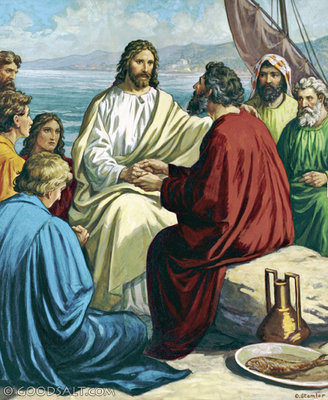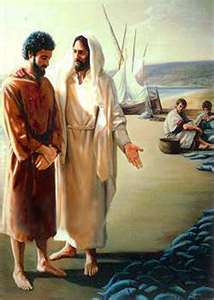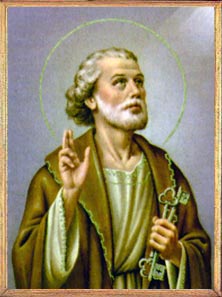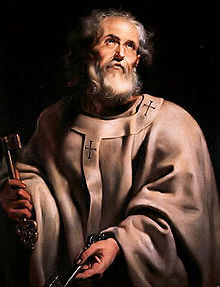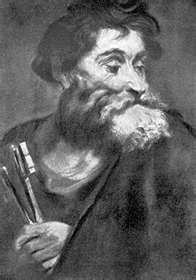12. Then spoke Jesus again to them, saying, I am the light of the world: he that follows me shall not walk in darkness, but shall have the light of life.
ALCUIN. Having absolved the woman from her Sill, lest some should doubt, seeing that He was really man, His power to forgive sins, He deigns to give further disclosure of His divine nature; Then spoke Jesus again to them, saying, I am. the Light of the world.
BEDE Where it is to be observed, He does not say, I am the light of Angels, or of heaven, but the Light of the world, i.e. of mankind who live in darkness, as we read, To give light to them that sit in darkness, and in the shadow of death.
CHRYS. As they had brought Galilee as an objection against Him, and doubted His being one of the Prophets, as if that was all He claimed to be, Me wished to show that He w as not one of the Prophets, but the Lord of the whole earth: Then spoke Jesus again to them, saying, I am the Light of the world: not of Galilee, or of Palestine, or of Judea.
AUG. The Manichaeans suppose the sun of the natural world to be our Lord Christ; but the Catholic Church reprobates such a notion for our Lord Christ was not made the sun, but the sun was made by Him: inasmuch as all things were made by Him. And for our sake did He come to be under the sun being the light which made the sun: He hid Himself under the cloud of the flesh, not to obscure, but to temper His light. Speaking then through the cloud of the flesh, the Light unfailing, the Light of wisdom says to men, I am the Light of the world.
THEOPHYL. You may bring these words against Nestorius: for our Lord does not say, In Me is the light of the world, but, I am the Light of the world: He who appeared man, was both the Son of God, and the Light of the world; not, as Nestorius fondly holds, the Son of God dwelling in a mere man.
AUG. He withdraws you however from the eyes of the flesh, to those of the heart, in that He adds, He that follows Me shall not walk in darkness, but shall have the light of life. He thinks it not enough to say shall have light, but adds, of life. These words of our Lord agree with those of the Psalm, In Your light shall we see light; for with you is the well of life. For bodily uses, light is one thing, and a well another; and a well ministers to the mouth, light to the eyes. With God the light and the well are the same. He who shines upon you, that you may see Him, the Same flows to you, that you may drink Him. What He promises is put in the future tense; what we ought to do in the present. He that follows Me, He says, shall have; i.e. by faith now, in sight hereafter. The visible sun accompanies you, only if you go westward, whither it go also; and even if you follow it, it will forsake you, at its setting. Your God is every where wholly; He will not fall from you, if you fall not from Him. Darkness is to be feared, not that of the eyes, but that of the mind; and if of the eyes, of the inner not the outer eyes; not those by which white and black, but those by which just and unjust, are discerned.
CHRYS. Walk not in darkness, i.e. spiritually abide not in error. Here He tacitly praises Nicodemus and the officers, and censures those who had plotted against Him; as being in darkness and error, and unable to come to the light.
13. The Pharisees therefore said to him, You bear record of yourself; your record is not true.
14. Jesus answered and said to them, Though I bear record of myself, yet my record is true: for I know whence I came, and whither I go; but you cannot tell whence I come, and whither I go.
15. You judge after the flesh; I judge no man.
16. And yet if I judge, my judgment is true: for I am not alone, but I and the Father that sent me.
17. It is also written in your law, that the testimony of two men is true.
18. I am one that bear witness of myself, and the Father that sent me bears witness of me.
CHRYS. Our Lord having said, I am the Light of the world; and, he that follows Me, walks not in darkness, the Jews wish to overthrow what He has said: The Pharisees therefore said to Him, you bear record of Yourself, Your record is not true.
ALCUIN. As if our Lord Himself were the only (one that bore) witness to Himself; whereas the truth was that He had, before His incarnation, sent many witnesses to prophesy of His Sacraments.
CHRYS. Our Lord however overthrew their argument: Jesus answered and said, Though I bear record of Myself, yet My record is true. This is an accommodation to those who thought Him no more than a mere man. He adds the reason, For I know whence I come and whither I go; i.e. I am God, from God, and the Son of God: though this He does not say expressly, from His habit of mingling lofty and lowly words together. Now God is surely a competent witness to Himself.
AUG. The witness of light is true, whether the light show itself, or other things. The Prophet spoke the truth, but whence had he it, but by drawing from the fount of truth? Jesus then is a competent witness to Himself: For I know whence I come, and whither I go: this has reference to the Father; for the Son gave glory to the Father who sent Him. How greatly then should man glorify the Creator, w ho made Him. He did not separate from His Father, however, when He came, or desert us when He returned: unlike that sun which in going to the west, leaves the east. And as that sun throws its light on the faces both of him who sees, and him who sees not; only the one sees with the light, the other sees not: so the Wisdom of God, the Word, is every where present, even to the minds of unbelievers; but they have not the eyes of the understanding, whereas with to see. To distinguish then between believers and enemies among the Jews, as between light and darkness, He adds, But you cannot tell whence I come, and whither I go. These Jews saw the man, and did not believe in the God, and therefore our Lord says, You judge after the flesh, i.e. in saying, You bear record of Yourself, Your record is not true.
THEOPHYL. As if to say: You judge untruly, according to the flesh, thinking, because I am in the flesh, that I am flesh only, and not God.
AUG. Understanding Me not as God, and seeing Me as man, you think Me arrogant in bearing witness of Myself. For any man who bears high testimony to himself, is thought proud and arrogant. But men are frail, and may either speak the truth, or lie: the Light cannot lie.
CHRYS. As to live according to the flesh is to live amiss, so to judge according to the flesh, is to judge unjustly. They might say, however, If we judge wrongly, why do you not convict us, why do you not condemn us? So He adds, I judge no man.
AUG. Which may be understood in two ways; judge no man, i.e. not now: as He says elsewhere, God sent not His Son into the world to condemn the world, but that the world through Him might be saved: not that He abandons, but only defers, His justice. Or having said, You Judge according to the flesh, He says immediately, I judge no man, to let you know that Christ does not judge according to the flesh, as men judged Him. For that Christ is a judge appears from the next words, And yet if I Judge, My judgment is true.
CHRYS. As if to say: In saying, I judge no man, I meant that I did not anticipate judgment. If I judged justly, I should condemn you, but now is not the time for judging. He alludes however to the future judgment, in what follows; For I am not alone, but I and the Father that sent Me; which means that He will not condemn them alone, but He and the Father together. This is intended too to quiet suspicion, as men did not think the Son worthy to be believed, unless He had the testimony of the Father also.
AUG. But if the Father is with You, how did He send You? O Lord, Your mission is Your incarnation. Christ was here according to the flesh without withdrawing from the Father, because the Father and the Son are every where. Blush, you Sabellian; our Lord does not say, I am the Father, and I the self-same person am the Son; but, I am not alone, because the Father is with Me. Make a distinction then of persons, and distinction of intelligences: acknowledge that the Father is the Father, the Son the Son: but beware of saying, that the Father is greater, the Son less. Theirs is one substance, one co-eternity, perfect equality. Therefore, He says, My judgment is true, because I am the Son of God. But that you may understand how that the Father is with Me, it is not for the Son ever to leave the Father. I have taken up the form of a servant; but I have not lost the form of God. He had spoken of judgment: now he speaks of witness: It is also written in your law, that the testimony of two men is true.
AUG. Is this made a bad use of by the Manichaeans, that our Lord does not say, in the law of God, but, in your law? Who does not recognize here a manner of speaking customary in Scripture? In your law, i.e. the law given to you. The Apostle speaks of his Gospel in the same way, though he testifies to having received it not from men, but by the revelation of Jesus Christ.
AUG. There is much difficulty, and a great mystery seems to be contained, in God's words, In the mouth of two or three witnesses, let every word be established. It is possible that two may speak false. The chaste Susannah was arraigned by two false witnesses: the whole people spoke against Christ falsely. How then must we understand the word, By the mouth of two or three witnesses shall every word be established: except as an intimation of the mystery of the Trinity, in which is perpetual stability of truth? Receive then our testimony, lest you feel our judgment. I delay My judgment: I delay not My testimony: I am one that bears witness of Myself, and the Father that sent Me bear witness of Me.
BEDE. In many places the Father bears witness of the Son; as, This day have I begotten You; also, This is My beloved Son.
CHRYS. It is written in your law, that the testimony of two men is true. If this is to be taken literally, in what respect does our Lord differ from men? The rule has been laid down for men, on the ground that one man alone is not to be relied on: but how can this be applicable to God? These words are quoted then with another meaning. When two men bear witness, both to an indifferent matter, their witness is true: this constitutes the testimony of two men. But if one of them bear witness to himself, then they are no longer two witnesses. Thus our Lord means to show that He is consubstantial with the Father, and does not need another witness, i.e. besides the Father's. I and the Father that sent Me. Again, on human principles, when a man bears witness, his honesty is supposed, he is not home witness to; and a man is admitted as a fair and competent witness in an indifferent matter, but not in one relating to himself, unless he is supported by other testimony. But here it is quite otherwise. Our Lord, though giving testimony in His own case, and though saying that He is borne witness to by another, pronounces Himself worthy of belief; thus showing His all-sufficiency. He says He deserves to be believed.
ALCUIN. Or it is as if He said, If your law admits the testimony of two men who may be deceived, and testify to more than is true; on what grounds can you reject Mine and My Father's testimony, the highest and most sure of all?
19. Then said they to him, Where is your Father? Jesus answered, You neither know me, nor my Father: if you had known me, you should have known my Father also.
20. These words spoke Jesus in the treasury, as he taught in the temple: and no man laid hands on him; for his hour was not yet come.
AUG. Those who had heard out Lord say, You judge after the flesh, showed that they did so; for they understood what He said of His Father in a carnal sense: Then said they to Him; Where is Your Father? meaning, We have heard you say, I am not alone, but I and the Father that sent Me. We see you alone; prove to us then that Your Father is with You.
THEOPHYL. Some remark that this is said in contumely and contempt; to insinuate either that He is born of fornication, and knows not who His Father is; or as a slur on the low situation of His father, i.e. Joseph; as if to say, Your father is an obscure, ignoble person; why do you so often mention him? So because they asked the question, to tempt Him, not to get at the truth, Jesus answered, You neither know Me, nor My Father.
AUG. As if He said, You ask where is Your Father? As if you knew Me already, and I were nothing else but what you see. But you know Me not, and therefore I tell you nothing of My Father. You think Me indeed a mere man, and therefore among men look for My Father. But, forasmuch as I am different altogether, according to My seen and unseen natures, and speak of My Father in the hidden sense according to My hidden nature; it is plain that you must first know Me, and then you will know My Father; If you had known Me, you would have known My Father also.
CHRYS. He tells them, it is of no avail for them to say they know the Father, if they do not know the Son.
ORIGEN. You neither know Me, nor My Father: this seems inconsistent with what was said above, You both know Me, and know whence I am. But the latter is spoken in reply to some from Jerusalem, who asked, Do the rulers know indeed that this is the very Christ? You neither know Me, is addressed to the Pharisees. To the former persons from Jerusalem however He said, He that sent Me is true, Whom you know not. You will ask then, How is that true, If you know Me, you would know My Father also? when they of Jerusalem, to whom He said, You know Me, did Dot know the Father. To this we must reply, that our Savior sometimes speaks of Himself as man, and sometimes as God. You both know Me, He says as man: You neither know Me, as God
AUG. What does this mean: If you knew Me, you would know My Father also, but, I and My Father are one? It is a common expression, when you see one man very like another, If you have seen him, you have seen the other. You say this, because they are so like. And thus our Lord says, It you had known Me, you had known My Father also; not that the Father is the Son, but that the Son is like the Father.
THEOPHYL. Let the Arian blush: for if, as he says, the Son be a creature, how does it follow that he who knows the creature, knows God? For not even by knowing the substance of Angels, does one know the Divine Substance? Forasmuch therefore as he who knows the Son, knows the Father, it is certain that the Son is consubstantial with the Father.
AUG. This word perhaps is used only by way of rebuke, though it seems to express doubt. As used by men indeed it is the expression of doubt, but He who knew all things could only mean by that doubt to rebuke unbelief: Nay, even we sometimes say perhaps, when they are certain of a thing, e.g. when you are angry with your slave, and say, Do not you heed me? Consider, perhaps I am your master. So our Lord's doubt is a reproof to the unbelievers, when He says, You should have known perhaps My Father also.
ORIGEN. It is proper to observe, that the followers of other sects think this text proves clearly, that the God, whom the Jews worshipped, was not the Father of Christ. For if, say they, our Savior said this to the Pharisees, who worshipped God as the Governor of the world, it is evident that the Father of Jesus, whom the Pharisees knew not, was a different person from the Creator. But they do not observe that this is a usual manner of speaking in Scripture. Though a man may know the existence of God, and have learned from the Father that He only must be worshipped, yet if his life is not good, he is said not to have the knowledge of God. Thus the sons of Eli, on account of their wickedness, are said not to have known God. And thus again the Pharisees did not know the Father; because they did not live according to their Creator's command. And there is another thing meant too by knowing God, different from merely believing in Him. It is said, Be still then, and know that I am God. And this, it is certain, was written for a people that believed in the Creator. But to know by believing, and believe simply, are different things. To the Pharisees, to whom He says, You neither know Me, nor My Father, He could with right have said, you do not even believe in My Father; for he who denies the Son, has not the Father, either by faith or knowledge. But Scripture gives us another sense of knowing a thing, viz. being joined to that thing. Adam knew his wife, when he was joined to her. And if he who is joined to a woman knows that woman, he who is joined to the Lord is one spirit, and knows the Lord. And in this sense the Pharisees neither knew the Father, nor the Son. But may not a man know God, and yet not know the Father; Yes; these are two different conceptions. And therefore among an infinite number of prayers offered up in the Law, we do not find any one addressed to God the Father. They only pray to Him as God and Lord; in order not to anticipate the grace shed by Jesus over the-whole world, calling all men to the Sonship, according to the Psalm, I will declare Thy name to my brethren.
These words spoke Jesus in the treasury, as He taught in the temple.
ALCUIN. Treasury (Gazophylacium): Gaza is the Persian for wealth: phylattein is to keep. It was a place in the temple, where the money was kept.
CHRYS. He spoke in the temple magisterially, and now He was speaking to those who railed at and accused Him, for making Himself equal to the Father.
AUG. Great however is His confidence and fearlessness: it not being possible that He should undergo any suffering, but that which He voluntarily undertook. Wherefore it follows, And no man laid hands on Him, for His hour was not yet come. Some, when they hear this, think Christ to have been under the control of fate. But if fate comes from the verb fari, to speak, as some derive it, how can the Word of God be under the control of fate? Where are the fates? In the heavens, you say, in the courses and revolutions of the stars. How then can fate have power over Him, by Whom the heavens and stars were made; when even your will, if you exert it aright, transcends the stars? Do you think that because the flesh of Christ was placed beneath the heavens, that therefore His power was subjected to the heavens? His hour then had not yet come; i.e. the hour, not on which he should be obliged to die, but on which He should deign to be put to death.
ORIGEN. When ever it is added, Jesus spoke these words in such a place, you will, if you attend, discover a meaning in the addition. The treasury was a place for keeping the money, which was given for the honor of God, and the support of the poor The coins are the divine words, stamped with the likeness of the great King. In this sense then let every one contribute to the edification of the Church, carrying into that spiritual treasury all that he can collect, to the honor of God, and the common good. But while all were thus contributing to the treasury of the temple, it was especially the office of Jews to contribute his gifts, which were the words of eternal life. While Jesus therefore was speaking in the treasury, no one laid hands on Him; His discourse being stronger than those who wished to take Him; for there is no weakness in that which the Word of God utters.
BEDE. Or thus; Christ speaks in the treasury; i.e. He had spoken in parables to the Jews; but now that He unfolded heavenly things to His disciples, His treasury began to be opened, which was the meaning of the treasury being joined to the temple; all that the Law and the Prophets had foretold in figure, appertained to our Lord.
Catena Aurea John 8


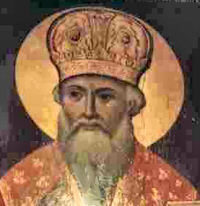
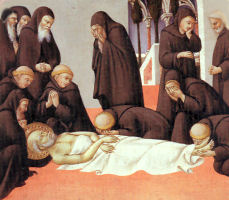 Tradition states that God rendered the holiness of this venerable Patriarch illustrious by signs from heaven, among which is numbered the apparition of a cross, brighter than the sun, which was seen at the beginning of his Patriarchate. Not only Cyril himself, but pagans and Christians alike were witnesses of this marvel, which Cyril, after having given thanks to God in church, announced by letter to Constantius. A thing no less wonderful came to pass when the Jews were commanded by the impious Emperor Julian to restore the Temple which had been destroyed by Titus. An earthquake arose and great balls of fire broke out of the earth and consumed the work, so that Julian and the Jews were struck with terror and gave up their plan. This had been clearly foretold by Cyril. A little while before his death, he was present at the Ecumenical Council at Constantinople, where the heresies of Macedonius and Arius were condemned. After his return to Jerusalem, he died a holy death at sixty-nine years of age in the thirty-fifth year of his bishopric. Pope Leo XIII ordered that his office and mass should be said throughout the Universal Church.
Tradition states that God rendered the holiness of this venerable Patriarch illustrious by signs from heaven, among which is numbered the apparition of a cross, brighter than the sun, which was seen at the beginning of his Patriarchate. Not only Cyril himself, but pagans and Christians alike were witnesses of this marvel, which Cyril, after having given thanks to God in church, announced by letter to Constantius. A thing no less wonderful came to pass when the Jews were commanded by the impious Emperor Julian to restore the Temple which had been destroyed by Titus. An earthquake arose and great balls of fire broke out of the earth and consumed the work, so that Julian and the Jews were struck with terror and gave up their plan. This had been clearly foretold by Cyril. A little while before his death, he was present at the Ecumenical Council at Constantinople, where the heresies of Macedonius and Arius were condemned. After his return to Jerusalem, he died a holy death at sixty-nine years of age in the thirty-fifth year of his bishopric. Pope Leo XIII ordered that his office and mass should be said throughout the Universal Church. 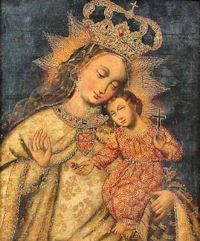 Devotion to the Virgin of Mercy dates back to the time of the founding of Lima. It is known that the Mercederian friars, who came to Peru with the conquerors, had already built their primitive convent chapel around 1535. This chapel served as Lima's first parish until the construction of the Main Church in 1540. The Mercederians not only evangelized the region, but they also participated in the city's development, building beautiful churches that have been preserved as a valuable cultural and religious patrimony.
Devotion to the Virgin of Mercy dates back to the time of the founding of Lima. It is known that the Mercederian friars, who came to Peru with the conquerors, had already built their primitive convent chapel around 1535. This chapel served as Lima's first parish until the construction of the Main Church in 1540. The Mercederians not only evangelized the region, but they also participated in the city's development, building beautiful churches that have been preserved as a valuable cultural and religious patrimony. 